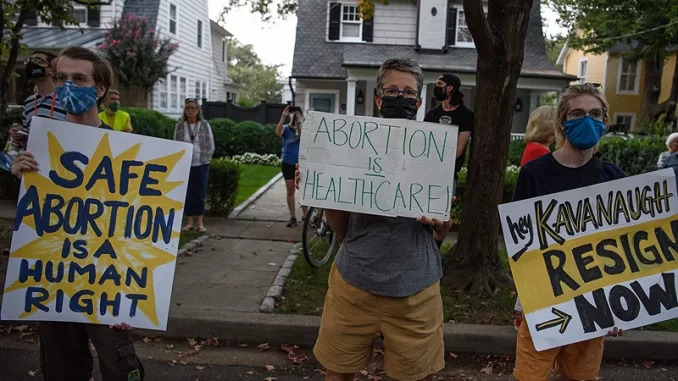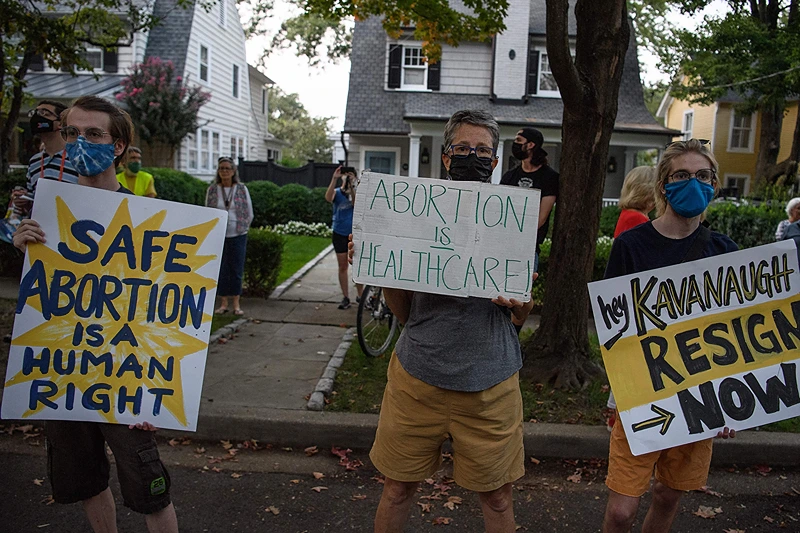

OAN Brooke Mallory
UPDATED 12:27 PM – Wednesday, March 22, 2023
Supporters of abortion rights filed an updated lawsuit on Tuesday in order to prevent Wyoming’s new ban on abortion pills from taking effect.
Just days after Governor Mark Gordon (R-Wyo.) signed the first-ever express ban on abortion drugs in the country, a group planning to operate what would be the second facility in the state offering abortions filed the revised lawsuit. That ban would go into force on July 1st if there is no court intervention.
Supporters of abortion rights had sought to overturn a separate, comprehensive abortion ban that went into force in Wyoming on Sunday without the governor’s signature. This law aims to override the arguments that led a judge to temporarily suspend a prior prohibition.
According to the lawsuit, the prohibition on abortion pills and the general prohibition clash would provide ambiguity over what is and isn’t legal under the new legislation.
If they are allowed to take effect, then “the fundamental rights of Wyoming women and their families will be taken away by the state government and those rights will cease to exist,” the modified lawsuit said.
Both of the recent Wyoming abortion restrictions allow for exceptions in cases of rape or incest that are reported to the authorities as well as to preserve the life of a pregnant woman.
According to the Guttmacher Institute, a research organization that promotes abortion rights, no state had passed a legislation specifically forbidding such medicines before Gordon signed the pharmaceutical abortion ban.
However, there are 13 other states that have outright restrictions on abortion, and 15 states already have restricted access to the medicines.
In a related case in Texas, pro-lifers are also asking a federal judge to overturn the Food and Drug Administration’s (FDA) 2000 clearance of mifepristone, which is used in abortion medications. The most popular method of abortion in the United States is a two-pill combination of mifepristone and misoprostol.
The only abortion facility in Wyoming is a women’s health center in Jackson that only performs medication abortions, but, since the state’s sweeping prohibition went into force this week, appointments there have now been canceled.
Judge Melissa Owens of the Teton County District Court will hold a hearing on Wednesday to decide whether to freeze the new prohibition while the legal disputes against it proceeds.
Wellspring Health Access has been preparing to open a clinic in Casper, Wyoming, that would offer both surgical and pharmaceutical abortions. The organization is fighting the abortion pill ban as well as the larger legislation.
The facility was supposed to operate as scheduled last summer, but an arson attempt prevented that from happening.
“Wyomingites deserve access to the full spectrum of reproductive health care, including both surgical and medication abortion, and that’s why we are fighting to keep medication abortion legal in Wyoming,” said Julie Burkart, the president of Wellspring Health Access.
Four women, including two gynecologists, and Chelsea’s Fund, a Wyoming-based organization that promotes abortion access, are also suing.
As she does with all statutes when their constitutionality is contested, Wyoming Attorney General Bridget Hill “will vigorously defend the legality of this law,” said spokesman Gordon Michael Pearlman in an email.
In spite of a restriction that was put in place when the Supreme Court decided to reverse its historic Roe v. Wade verdict, abortion was nevertheless permitted in Wyoming up until last week. The restriction was suspended in July after Owens determined that it would be detrimental to both doctors and pregnant women who are experiencing problems.
She also discovered that an abortion would be permitted under a 2012 state constitutional amendment that guaranteed the freedom to make one’s own health care decisions.
The new broad ban claimed that because abortion is not considered medical care, the amendment does not apply to it.
Since Roe was overturned in June, states are now in charge of regulating abortion, and the situation has rapidly changed.
Arizona, Indiana, Montana, Ohio, South Carolina, and Utah are other states where courts have temporarily suspended or limited the use of certain substances.
The state of Idaho was compelled by the courts to permit abortions under medical crises.

Be the first to comment